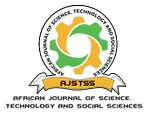Knowledge, attitude, practices, and beliefs among religious leaders on uptake and adoption of routine immunization in Turkana, Samburu, Kitui, Kwale, and Garissa counties in Kenya
DOI:
https://doi.org/10.58506/ajstss.v4i2.304Keywords:
Religious leaders, Routine Immunization, VaccinationAbstract
Vaccination remains the most effective method for controlling communicable diseases. Vaccine hesitancy due to inadequate knowledge, negative attitudes, perceptions, practices, and beliefs among religious leaders is a significant obstacle to this achievement. Engaging religious leaders in Low and Middle-Income Countries (LMICs) can enhance vaccination coverage. This study employed a cross-sectional mixed-methods approach to investigate the knowledge, attitudes, beliefs, and practices regarding vaccine uptake among religious leaders in the selected five counties. Data were collected through structured questionnaires, and information was triangulated through qualitative data collection from key informants, including sub-county medical officers of health, health promotion officers, Expanded Program of Immunization (EPI) coordinators, and community leaders. A total of 387 respondents were sampled through stratified and purposive random sampling, yielding a response rate of 95.1%. Data were analyzed using SPSS (version 29).
The study found low knowledge, at 48%, regarding routine immunisation among religious leaders. Eighty-four per cent (84%) believed that vaccines were beneficial to society at large, albeit with low coverage. Demonstrating this, 62% (240) of the interviewees had received the first dose of the COVID-19 vaccine. However, only 29% (70) had taken the second dose. Only 20% (31) of the eligible girls had received the first dose of the HPV vaccine. Of the 20% who received the first dose, only 19.4% (5) returned for the second dose, demonstrating a negative attitude. The study indicates that religious leaders’ beliefs and attitudes significantly influenced vaccine uptake. The study recommends increased knowledge transfer at the religious congregational level by stakeholders. Secondly, stakeholders should enhance advocacy and social mobilisation efforts to promote uptake of the HPV and COVID-19 vaccine second dose. Thirdly, the Ministry of Health should strengthen collaborative and supportive linkages among stakeholders, religious leaders and the community for sustained vaccine uptake. Lastly, religious leaders should utilise scripture to promote health through routine immunisation.


